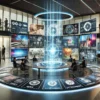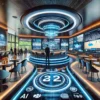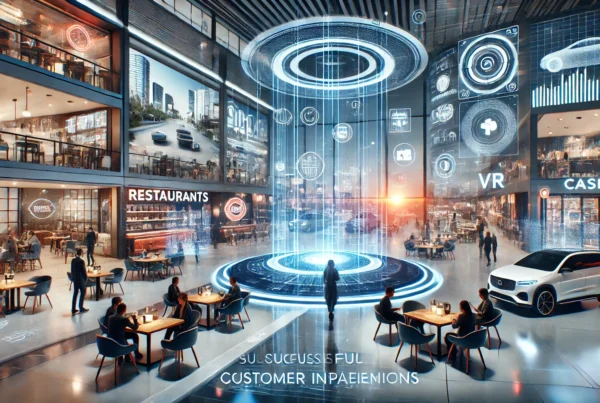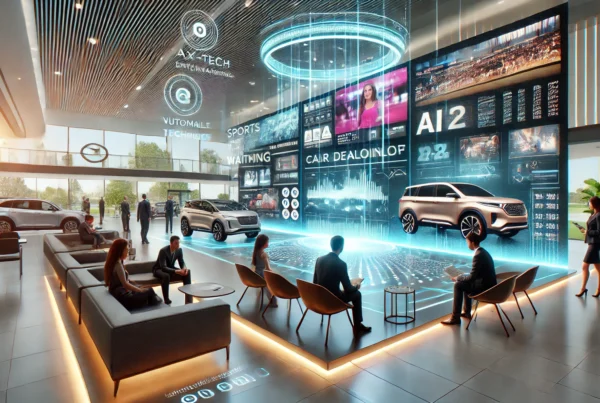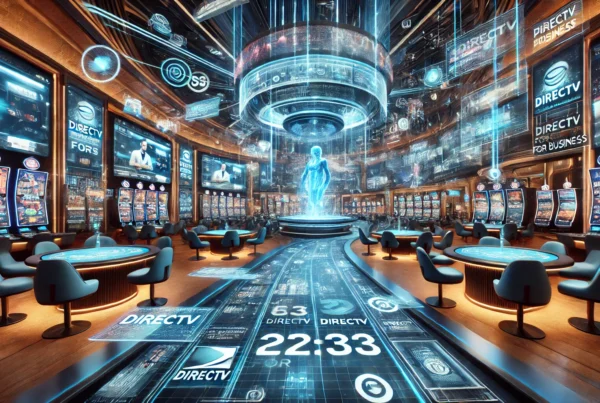In the fast-evolving world of on-premise entertainment, staying ahead of the curve requires more than just a captivating venue and quality service. As we step into 2025, businesses within the hospitality, gaming, and automotive sectors are discovering that innovative marketing strategies are the key to not only attracting customers but also creating memorable experiences that keep them coming back. In this dynamic landscape, the challenge lies in finding the right mix of creativity and technology to engage your audience effectively.
With the rise of digital technology, customers now expect a seamless blend of online and offline experiences. This means that traditional marketing methods often fall short. According to a report by Deloitte, businesses that integrate digital solutions into their marketing strategies see an increase in customer engagement by up to 30%. This highlights the importance of adopting new strategies that leverage digital innovation, such as augmented reality and personalized content.
At Sports Direct, our mission is to revolutionize the way businesses approach on-premise entertainment by providing cutting-edge video programming solutions. We understand the unique challenges faced by industries like hospitality and gaming, where customer experience is paramount. By exploring innovative marketing strategies, we aim to empower business owners to create environments that resonate with their audiences, fostering loyalty and increasing satisfaction.
In this blog post, we’ll delve into actionable insights and creative approaches to elevate your on-premise entertainment offerings. From harnessing the power of digital platforms to creating immersive experiences that captivate your audience, we’ll guide you through the essential strategies to thrive in this competitive landscape. Stay tuned as we uncover the secrets to crafting unforgettable experiences that set your business apart.
Leveraging Digital Innovation for Enhanced Experiences
In the realm of on-premise entertainment, digital innovation is not just a trend but a necessity. As businesses strive to create memorable and engaging experiences, integrating technologies like augmented reality (AR) and data analytics becomes crucial. These tools not only enhance customer interactions but also provide a competitive edge in a rapidly evolving market.
By leveraging digital innovation, businesses can offer personalized experiences that resonate with their audience. For example, augmented reality can transform a simple visit to a venue into an immersive adventure, while data analytics can tailor experiences to individual preferences, increasing customer satisfaction and loyalty.
Augmented Reality: Transforming Customer Engagement
Augmented reality has emerged as a powerful tool in creating engaging and interactive experiences. In the hospitality and gaming industries, AR can be used to provide virtual tours, interactive games, or even personalized recommendations. Imagine a casino where guests can use AR glasses to visualize game tutorials or a restaurant offering virtual menus that display dish ingredients and preparation methods.
Successful implementations of AR in on-premise entertainment demonstrate its potential. For instance, a renowned theme park integrated AR into its attractions, allowing visitors to interact with virtual characters and participate in augmented reality scavenger hunts. This not only enhanced the visitor experience but also increased the park’s foot traffic and social media engagement.
Data Analytics: Personalizing the Customer Journey
Data analytics plays a pivotal role in personalizing customer experiences. By analyzing customer data, businesses can gain insights into preferences, behaviors, and trends, enabling them to tailor their offerings accordingly. This approach is particularly beneficial in the auto industry, where dealerships can use data to recommend vehicles based on a customer’s past purchases or browsing history.
One successful case study involves a leading hotel chain that utilized data analytics to personalize guest experiences. By analyzing booking patterns and feedback, the hotel was able to offer customized room amenities and personalized services, resulting in a significant increase in customer satisfaction and repeat bookings.
Integrating Mobile Apps for Seamless Experiences
Mobile apps are essential in bridging the gap between online and offline experiences. They provide a platform for businesses to engage with customers before, during, and after their visit. In the hospitality sector, apps can offer features such as online reservations, digital loyalty programs, and real-time updates on events and promotions.
A notable example is a popular restaurant chain that developed a mobile app to enhance the dining experience. The app allowed customers to view menus, place orders, and pay digitally, reducing wait times and improving service efficiency. Additionally, the app’s loyalty program offered personalized discounts and rewards, encouraging repeat visits and fostering customer loyalty.
Creating Community-Driven Events for Customer Engagement
In the competitive landscape of on-premise entertainment, fostering a sense of community can significantly enhance customer loyalty and engagement. Community-driven events serve as a powerful tool to create lasting connections between businesses and their patrons. By hosting events that resonate with the local community, businesses can transform their venues into vibrant hubs of activity and interaction.
These events are not just about entertainment; they are about building relationships and providing value beyond the typical customer experience. From meet-and-greets with local influencers to interactive workshops, community events can offer unique opportunities for engagement that traditional marketing strategies might miss. As a result, businesses not only attract new customers but also deepen their relationship with existing ones, fostering a loyal customer base.
Successful Examples of Community Events
Many businesses have successfully implemented community-driven events to boost engagement. For instance, a popular restaurant chain hosted a series of cooking workshops featuring local chefs. These events drew significant attention from food enthusiasts and helped the restaurant establish itself as a community staple. Attendees not only enjoyed learning new recipes but also shared their experiences on social media, amplifying the restaurant’s reach.
Similarly, a renowned casino organized a series of poker tournaments open to local players. These events not only increased foot traffic but also created a sense of camaraderie among participants. The casino leveraged these tournaments to build a community of poker enthusiasts who regularly visited the venue, significantly enhancing customer loyalty.
Impact on Customer Loyalty
Community-driven events have a profound impact on customer loyalty. By offering unique experiences that resonate with the audience, businesses can create emotional connections that go beyond transactional interactions. Customers who feel connected to a brand are more likely to return and recommend the venue to others.
For example, a car dealership that hosted a series of automotive workshops saw a noticeable increase in repeat customers. These workshops provided valuable insights into vehicle maintenance and customization, positioning the dealership as a trusted resource in the community. As a result, customers felt a stronger bond with the brand, leading to increased loyalty and advocacy.
Strategies for Implementing Community Events
To successfully implement community-driven events, businesses should start by understanding their audience’s interests and preferences. Conducting surveys or engaging with customers on social media can provide valuable insights into the types of events that would resonate most.
Once the audience’s interests are identified, businesses can plan events that align with these preferences. Collaborating with local influencers or community leaders can also enhance the event’s credibility and reach. Additionally, promoting the events through various channels, such as social media, email newsletters, and in-store signage, can maximize attendance and engagement.
By strategically planning and executing community-driven events, businesses can create memorable experiences that foster customer loyalty and engagement, setting themselves apart in the competitive landscape of on-premise entertainment.
Harnessing User-Generated Content for Authentic Engagement
In the ever-evolving landscape of on-premise entertainment, businesses are constantly seeking ways to engage their audience authentically. One of the most effective strategies is leveraging user-generated content (UGC). This approach not only builds trust but also enhances brand authenticity, creating a community-driven atmosphere that resonates with customers.
UGC is a powerful tool because it allows customers to share their experiences, providing genuine insights into a brand’s offerings. This type of content is perceived as more trustworthy than traditional advertising, as it comes from real users rather than the brand itself. By encouraging customers to create and share content, businesses can foster a sense of community and belonging, which is crucial for building long-term customer relationships.
Successful UGC Campaigns in Entertainment
Several brands have successfully harnessed UGC to enhance their marketing efforts. For instance, a renowned hotel chain launched a campaign encouraging guests to share photos of their stay using a specific hashtag. This not only increased the brand’s visibility on social media but also provided authentic content that the hotel could use in its marketing materials.
Similarly, a popular restaurant chain invited customers to share their dining experiences through videos and photos. The campaign resulted in a significant increase in social media engagement and helped the restaurant establish a more personal connection with its audience. These examples highlight how UGC can be a game-changer in creating authentic engagement.
The Role of UGC in Building Brand Trust
UGC plays a crucial role in building brand trust. When potential customers see real people enjoying a brand’s products or services, they are more likely to trust the brand. According to a study by Nielsen, 92% of consumers trust recommendations from other people over branded content.
By showcasing UGC, businesses can demonstrate transparency and authenticity, which are key factors in gaining consumer trust. This approach not only enhances the brand’s credibility but also encourages more customers to share their experiences, creating a positive feedback loop of engagement and trust.
Implementing UGC Strategies for On-Premise Entertainment
To effectively implement UGC strategies, businesses should start by identifying the platforms where their audience is most active. Encouraging customers to share their experiences through contests or hashtag campaigns can be an effective way to generate UGC.
Additionally, businesses should actively engage with the content shared by their customers. This could involve featuring customer photos or testimonials on the brand’s website or social media channels. By acknowledging and appreciating customer contributions, businesses can strengthen their relationship with their audience and foster a sense of community.
In conclusion, harnessing user-generated content is a powerful way to engage customers authentically and build lasting relationships. By incorporating UGC into their marketing strategies, businesses in the on-premise entertainment industry can enhance their brand authenticity and create meaningful connections with their audience.
Embracing Innovation for Lasting Customer Engagement
As we navigate the dynamic landscape of on-premise entertainment, embracing innovative marketing strategies is crucial for creating memorable customer experiences. The integration of digital technologies such as augmented reality and data analytics has proven to be a game-changer, offering businesses the tools to personalize and enhance customer interactions. By leveraging these technologies, companies can not only meet the ever-evolving expectations of their audience but also position themselves as leaders in their respective industries.
Key takeaways from exploring these strategies include:
- Augmented Reality: Transform customer engagement by providing immersive experiences that captivate and entertain.
- Data Analytics: Use data to personalize customer journeys, tailoring experiences to individual preferences and increasing loyalty.
- Community-Driven Events: Foster a sense of community and belonging through events that resonate with local interests and build lasting relationships.
- User-Generated Content: Enhance brand authenticity by encouraging customers to share their experiences, thereby creating a community-driven atmosphere.
Adopting these strategies not only enhances customer satisfaction but also drives business growth. As businesses continue to innovate, the potential to create unforgettable experiences that resonate with audiences becomes limitless. To explore more strategies and insights, visit Sports Direct for comprehensive solutions tailored to your industry.
How will you leverage these innovative approaches to revolutionize your on-premise entertainment offerings? Share your thoughts and join the conversation in the comments below. Remember, the future of customer engagement lies in the seamless integration of technology and creativity, setting your business apart in a competitive market.



